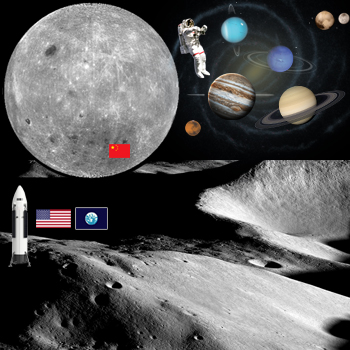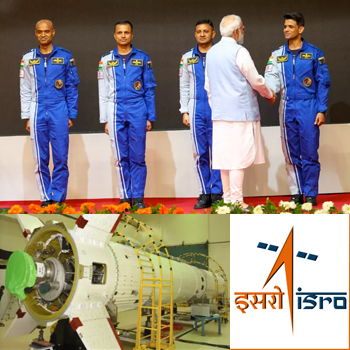July 2024 Space Month Challenges and Opportunities
Monday start to July 2024 International Space Month begins with inspired visions of a human return to the lunar surface, possibly 2026. USA with its Artemis international and commercial partners could accelerate work for a human lunar landing near the Moon South Pole during the nation’s quarter-millennium / 250th birthday observation. China and its 12 international and 12 NGO partners advance the International Lunar Research Station for a crewed landing in the late 2020s through step-by-step robotic missions—the latest of which, Chang’E-6, deploys the first national flag on the Moon far half. The first return in the 21st Century of the USA 50 star flag landed on the lunar surface near the Malapert A crater on Intuitive Machines IM-1 mission in February 2024. Future NASA Commercial Lunar Payload Services (CLPS) and Human Landing System (HLS) task orders might be issued asap for the highly valuable, high ground at ~5,000 meters on Malapert Massif “the mountain on the Moon”. Exploration of the South Pole, being first to touchdown at the unvisited, relatively smooth summit of Malapert ~86° S to raise a flag In Peace for All could have profound effects for generations to come. Earth’s 8th continent, Luna, remains the first stop in enabling a Multi Planet Civilization while reaching for the Stars and towards Solar System Complete habitation. (Image Credits: NASA, GSFC, Arizona State University, SpaceX) |
MONDAY☆ Jul 1 — International Space Station, ~415-km LEO: Two members of Boeing Starliner CST-100 awaiting final review of thrusters (5 of 28 had issues) and helium gas leaks to determine date for return to Earth – could board SpaceX Dragon for return if needed; Expedition 71 seven-member crew may attempt EVA 90 this week; ISS prepared for Progress 89P launch / arrival in August after orbit altitude reboosted by Progress 87P thrusters during 23.25-minute burn. ☆ Jul 1 — Tiangong Space Station, ~390-km LEO: Shenzhou 18 three-member crew working with ~5,600 kg of cargo and supplies from Tianzhou 7 while filling ship with waste for future Earth atmosphere disposal; Tianzhou 8 to launch in Sep from Wenchang; Tiangong ‘Heavenly Palace’ able to be tracked for possible viewing from Earth using Heavens Above. ☆ Jul 1 — Deep Space: Juno producing detailed images of moon Io lava lakes from 35,000 km distance with Infrared Auroral Mapper; at Jupiter since July 4, 2016, Juno’s next Perijove (63) planned to occur ~2 weeks, last Perijove (75) set for Sep 2025. Highlights… o NewSpace: ispace of Japan Hakuto-R Mission 2 Resilience lunar lander onto next analyses after successful 10-day thermal testing, planned to launch Winter 2024; ILOA Hawai’i aiming for flagship ILO-1 to Malapert Mountain NLT 2026 while planning precursor ILO-C to Shackleton, and lunar-focused Galaxy Forum China 2024 Hainan; under US$843M contract SpaceX to build United States Deorbit Vehicle (USDV) to control re-entry / end ISS mission possibly 2031. ☆ Galaxy: Research suggests metal-rich, older stars, such as those found in Orion-Cygnus arm, may be most hospitable for accompanying exoplanets to harbor life; ESO studying galaxy located 360M ly from Earth undergoing ‘brightening’ likely from black hole energetic material consumption; exoplanets, near Gliese 12 discovered ~40 ly away by TESS, sized between that of Earth and Venus may be considered for Webb telescope future observations. o Global: China announces long-range Solar System exploration withTianwen-2 to Main Asteroid Belt in 2025, Tianwen-3 for Mars sample return 2030, Tianwen-3 to Jovian system 2030; Space Machines Company of Australia to launch 450-kg Optimus spacecraft on ISRO SSLV in 2026 via NewSpace India Limited agreement; African Development Satellite collaboration project by 6 Africa nations to launch 2024, as well as SPINX climate change satellite by 4 Africa nations. |
 |
● = Terrestrial and… o = International terrestrial events
☾ = Moon activity ★ = Space and… ☆ = International space / astro events in Hawaii Standard Time unless noted. Add 10 hours to obtain UT (‘Universal Time’). |
Weekly Planet Watch – Morning Planets: Mars (E), Jupiter (ENE), Saturn (SE); Evening Planets: Mercury (WNW), Venus (WNW).
India Space Research Organisation (ISRO) Leads a Vibrant Indian Space Environment |
☆ NET Jul — ISRO, Launch LVM-3 (Launch Vehicle Mark-3) / Gaganyaan G2, Satish Dhawan Space Center, Sriharikota, India: India planning for 1st uncrewed flight of Gaganyaan on a short orbital test flight. ☆ Jul 1 — JAXA, Launch H3 / ALOS-4, Tanegashima Space Center, Japan: Mitsubishi Heavy Industries H-3 rocket will launch Advanced Land Observing Satellite-4 (ALOS-4) Earth observation satellite. ★ Jul 1 — SpaceX, Launch Falcon 9 / Starlink 8-9, SLC-40, Cape Canaveral SFS FL: Falcon 9 to launch next batch of Starlink v2-mini satellites. o Jul 1-5 — European Astronomical Society (EAS), Kuoni Tumlare, Padova, Italy: EAS Annual Meeting; at Padova Congress. o Jul 1 – Aug 30 — Academia Sinica Institute of Astronomy and Astrophysics, Taipei, Taiwan: 2024 Summer Student Program; students conduct original research under supervision of professional astronomers. ☾ Jul 1 — Moon: 3.8° NNW of Mars, 07:00; 3.8° NNW of Uranus, 23:00. Ongoing… ● May 28 – Aug 7 — LPI-JSC Center for Lunar Science and Exploration, Houston TX: Exploration Science Summer Intern Program. ● Jun 8 – Aug 3 — International Space University (ISU), Rice University, NASA, Johnson Space Center, Houston TX: 36th ISU Space Studies Program (SSP 2024). TUESDAY☆ NET Jul 2 — International Space Station, U.S. EVA #90, ~415-km LEO: Expedition 71 planning 6.5-hour spacewalk, Tracy C. Dyson and Mike Barratt will exit Quest airlock to complete the removal of a faulty electronics box; starts 07:30 EDT, live coverage available. o Jul 2 — CNES, Promethée Earth Intelligence, Monaco Space Affairs Office, et al, Monaco Ville, Monaco: The (2nd) Ocean Space Forum; to highlight the contribution of NewSpace technologies to ocean preservation and sustainable management. ☾ Jul 2 — Moon: 0.41° ESE of Pleiades, 07:00; 4.9° N of Jupiter, 21:00. WEDNESDAY☆ Jul 3 — Apollo Asteroid 585310 (2017 YZ1): Near-Earth Flyby (0.071 AU) |
THURSDAY
★ Jul 4 — Juno, Jupiter Orbit: Spacecraft reaches 8th full year at Jupiter today; one-way transmission signal to Earth is 48 minutes, mission extended through September 2025.
☆ Jul 4 — CNSA, Launch Long March 6 / Unknown Payload, Taiyuan Satellite Launch Center, China: CNSA / China unknown payload to launch.
● Jul 4 — Space Age Publishing Company, Palo Alto CA: Galaxy Forum USA 2024 Silicon Valley; featuring Pascal Lee (Mars Institute), Simon Steel (SETI Institute), Steve Durst (SPC and ILOA Hawai’i); at the Vi, 09:30-11:30am.
☆ Jul 4 — Earth: At aphelion, 1.0167 AU from Sun, 20:00.
☾ Jul 4 — Moon: 4.1° N of M35 cluster, 16:00.
FRIDAY
o Jul 5-6 — Space Generation Advisory Council, NASA, Lockheed Martin, UK Space Agency, et al, San Andrés Cholula, Puebla, México: SG [Mexico] 2024; at Instituto Nacional de Astrofisica, Optica y Electronica.
☾ Jul 5 — Moon: New Moon, 12:58.
☆ Jul 5 — Dwarf planet 1 Ceres: At opposition in longitude, magnitude 7.3, 05:00.
☆ Jul 5 — Aten Asteroid 523808 (2007 ML24): Near-Earth Flyby (0.090 AU)
SATURDAY
☾ Jul 6 — Moon: 5.2° S of Castor, 01:00; 1.84° S of Pollux, 07:00; 3.8° NNE of Venus, 07:00.
☆ Jul 6 — Venus: 5.6° S of Pollux, 03:00.
☆ Jul 6 — Mercury: 0.11° NNE of Beehive Cluster, 19:00.
SUNDAY
● Jul 7 — Johnson Space Center, NASA, Houston TX: 1-Year Crew Health and Performance Exploration Analog (CHAPEA 1) mission ends today with 4-member crew emerging from isolation at Mars Dune Alpha habitat.
☾ Jul 7 — Moon: 3.2° NNE of Beehive Cluster, 09:00; with Mercury and Beehive Cluster within circle of diameter 3.20°, 09:00; 3.1° NNE of Mercury, 21:00.
☆ Jul 7 — Apollo Asteroid 2017 ND: Near-Earth Flyby (0.067 AU)

